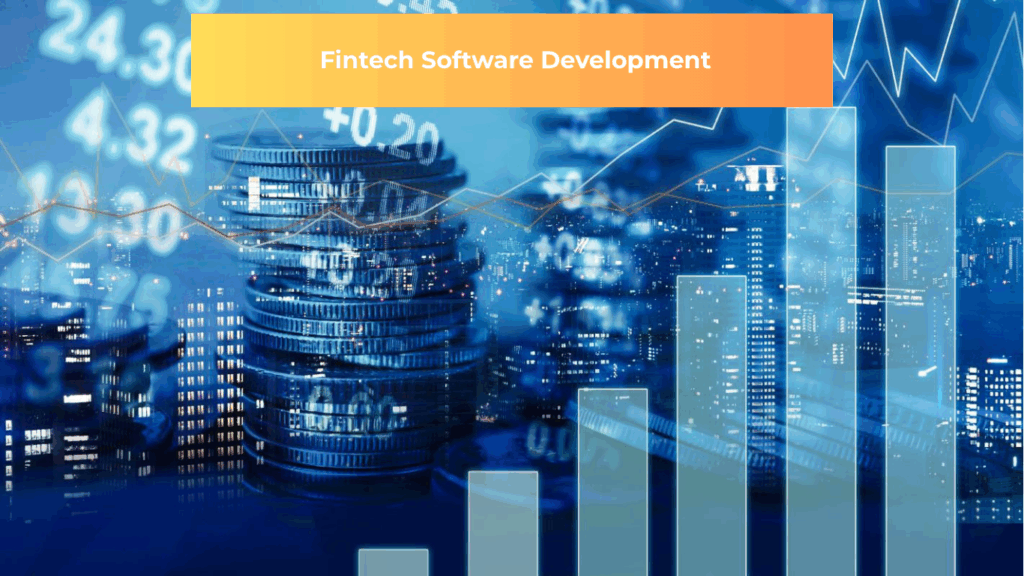Fintech software development is the key to turning this vision into reality, redefining how businesses deliver value in a digital-first world. By creating tailored, secure, and innovative applications, fintech software development empowers organizations to drive fintech-driven business transformation, from seamless payments to intelligent wealth management.
👉This article explores the process, benefits, challenges, and trends of fintech software development, revealing how it shapes the future of finance through fintech-powered decision making and scalable fintech solutions.
Fintech: From Crisis to Cutting Edge
Defining Fintech
Picture a world where your bank is always open, your payments are instant, and your investments grow with a tap. That’s fintech, short for financial technology, a game-changer that blends tech smarts with financial know-how. It’s the engine behind apps that let you send money to a friend in seconds, platforms that offer tailored investment advice, and systems that keep your data safe. Through fintech software development, fintech creates tools like digital wallets, neobanks, and blockchain-based transactions, making finance faster, more accessible, and user-friendly.
Whether you’re a small business owner or just managing your savings, fintech software development services empower you to take control with solutions that feel intuitive and personal.
A Journey Through Fintech’s Past
Fintech’s story is one of solving problems with clever tech, stretching back over a century. It kicked off in 1871 when Western Union made sending money across the Wild West as easy as sending a telegram—safe, quick, and a total game-changer. By the 1960s, Barclays rolled out the first ATMs in London, letting people grab cash without waiting in line. The 1980s introduced telephone banking, but the 1990s stole the show with online banking and PayPal, fueled by the rise of online shopping giants like Amazon. AI started sniffing out fraud, scanning millions of transactions weekly to save billions.
Then came the 2008 financial crisis—a massive shake-up that changed everything. Banks like Lehman Brothers collapsed, the housing market tanked, and trust in traditional finance hit an all-time low. People were fed up, and the timing was perfect for fintech to shine. Smartphones were everywhere, letting startups like Monzo and Starling offer slick, app-based banking with no fees.

Bitcoin’s 2009 launch brought blockchain into the spotlight, kicking off a crypto craze that, despite crashes, showed the power of decentralized tech. New regulations after the crisis gave fintechs room to innovate while banks faced tighter rules, sparking a wave of custom fintech software development for lending, payments, and more. From telegraph wires to blockchain, fintech’s history is about making money work better for everyone.
Fintech’s Evolution Today
Fintech in 2025 is like a bustling digital city: full of life, innovation, and endless possibilities. It’s not just about fancy apps; it’s about reimagining how we interact with money. AI and machine learning are the brains of the operation, powering chatbots that answer your banking questions instantly and systems that catch fraud before it strikes, like Revolut’s AI fraud-buster. Blockchain, born with Bitcoin, is now a trust machine, securing everything from global payments to supply chains with its tamper-proof ledger.
Open banking lets you share your bank data (safely, of course) with apps that offer personalized budgeting or loan deals, making finance feel like it’s built just for you. Cybersecurity is the silent guardian, using biometric scans and encryption to keep your money locked tight. Embedded finance sneaks banking into everyday life—think splitting payments when you shop online or booking a ride with built-in insurance. Decentralized finance (DeFi) is the wild card, letting you lend or borrow on blockchain platforms without a bank, though it’s a bit like the Wild West with fewer rules.
Fintech isn’t a solo act anymore; banks and startups are teaming up, with banks buying fintechs or investing billions to stay in the game. Tech giants like Apple and Google are jumping in too, offering wallets and payment systems. With venture capital pouring in—2021 saw record-breaking investments—and unicorns (startups worth over $1 billion) sprouting up, fintech software development companies are driving a future where finance is inclusive, intuitive, and always evolving. It’s a world where money works smarter, and everyone’s invited to the party.
| Era | Key Developments | Impact |
| Pre-2008 | Telegraph transfers (1871), ATMs (1967), online banking (1990s), early AI fraud detection | Laid groundwork for digital finance, increased accessibility |
| 2008 Crisis (Fintech 3.0) | Fintech startups, Bitcoin (2009), smartphone banking, Google Wallet (2011), Apple Pay (2014) | Disrupted traditional banking, introduced decentralized finance |
| 2014-2017 (Fintech 3.5) | Global expansion, digital banking in emerging markets, open banking APIs | Broadened financial inclusion, fostered innovation in developing regions |
| 2018-Today (Fintech 4.0) | Neobanks, AI-driven services, blockchain, embedded finance, DeFi, cybersecurity | Transformed user experience, enhanced security, and collaboration |
What is Fintech Software Development?

Picture a world where sending money is as easy as a text, investing feels like a game, and your bank knows you better than you know yourself. That’s the magic of fintech software development, the craft of building tech solutions that make finance faster, friendlier, and more secure. It’s not just code—it’s a bridge between old-school banking and today’s digital demands, creating everything from slick mobile apps to blockchain-powered platforms.
Born from the need to fix a clunky, distrusted financial system, especially after the 2008 crisis shook things up—fintech software development took off as startups saw a chance to rethink money. The crisis exposed banks’ flaws, and with smartphones flooding the market, innovators used fintech software development services to craft tools like digital wallets, neobanks, and AI-driven loan systems. Think of PayPal in the ‘90s or Monzo’s rise post-2008, these were built to meet real needs, like instant payments or fee-free banking.
Today, in the era of Fintech 4.0, custom fintech software development powers secure, scalable solutions for payments, lending, wealth management, and compliance, using AI, blockchain, and cloud tech to make finance feel personal and effortless for businesses and users worldwide.
The Benefits of Fintech Software Development
- Streamlined Efficiency: Leave repetitive manual tasks behind. Automation in fintech can cut through complex processes such as loan approvals and transaction reconciliations, sometimes reducing error rates by as much as 90% (McKinsey, 2024). AI-driven systems can turn days-long approval waits into just minutes.
- Great User Experiences: Today’s customers want apps that are easy and enjoyable to use. Custom fintech development creates sleek apps with features like real-time budgeting or automated investment tips. These user-friendly interfaces keep people engaged and loyal to your brand.
- Ironclad Security: Protecting financial data is more important than ever. Advanced encryption, multi-factor authentication, and biometric scans like facial recognition are built in to keep transactions safe.
- Effortless Scalability: As you grow, your platform needs to keep up. Scalable fintech solutions can manage increasing transaction volumes smoothly. For example, PayPal scaled its infrastructure to handle $1.5 trillion in payments in 2023, easily supporting global expansion.
- Cost Optimization: Automating workflows and moving away from outdated systems can significantly lower operational costs.
If these benefits appeal to you, fintech software development might be the key to taking your financial offerings to the next level.
👉 Explore now!
Challenges in Fintech Software Development
Building great fintech solutions is rewarding, but not without obstacles. Here’s a look at the main challenges—and how expert fintech developers tackle them.
- Cybersecurity Threats: Financial data is valuable, making it a favorite target for hackers. Top-tier fintech development includes cutting-edge defenses like real-time threat detection and full encryption.
- Regulatory Compliance: The world of finance is tightly regulated. Meeting international standards such as GDPR, PCI DSS, and KYC/AML is complex, with automated checks now essential to stay compliant. Mistakes can mean hefty fines.
- Legacy System Integration: Many banks still rely on old mainframes, making it difficult to connect with new apps. Middleware and APIs bridge this gap, letting banks modernize their platforms without starting from scratch.
- Handling Fast Growth: Payment platforms often need to scale quickly, especially during busy periods like Black Friday. Cloud architectures are frequently used, but scaling incorrectly can lead to system failures.
- Balancing Speed and Stability: There’s always pressure to launch features fast. But cutting corners can risk bugs or security gaps. Experienced fintech developers find the right balance to keep software safe and reliable.
Partnering with expert fintech software development companies helps turn these challenges into opportunities, ensuring solutions are secure and compliant.
The Fintech Software Development Process
Building fintech software development solutions is like crafting a high-tech financial Swiss Army knife—it’s precise, purposeful, and packed with features. The process follows a five-step roadmap, designed to tackle the financial industry’s unique challenges. Here’s how it works:
1. Discovery
This is where the journey starts—digging deep into what a business needs, what users want, and what systems already exist. Back in Fintech 3.0 (2008-2014), startups like Starling used this step to spot gaps in traditional banking, like slow transfers or high fees, leading to ideas for neobank apps. It’s about asking, “How can we make finance better?”
2. Design
Next, it’s time to sketch the blueprint—creating user-friendly interfaces and robust architectures that play nice with old banking systems. In Fintech 3.5 (2014-2017), global expansion demanded designs that worked across borders, like apps for emerging markets with spotty banking infrastructure.
3. Development
Here’s where the magic happens—coding solutions like payment gateways or AI-driven lending platforms using agile methods for speed and flexibility. Fintech 4.0 (2018-today) thrives on this, with tools like Revolut’s AI fraud detection built to adapt to new threats fast.
4. Testing
Before launch, every nook and cranny is checked—security, speed, and compliance with regulations like GDPR. This step grew critical post-2008, as trust in finance hinged on bulletproof systems, ensuring secure fintech applications that won’t let users down.
5. Deployment
Finally, the solution goes live with a clear fintech implementation roadmap, built to scale and evolve. Today’s embedded finance and DeFi platforms, like those powering Shopify payments, rely on this step to handle global growth without a hitch.
This process, refined from agile methodologies used by tech giants and fintech pioneers, ensures fintech software development services deliver tools that drive fintech-driven business transformation, making finance smarter, safer, and ready for the future.
Trends Shaping Fintech Software Development in 2025
1. Artificial Intelligence and Machine Learning
AI is everywhere in fintech, making services faster and more personalized. Banks now use AI for real-time fraud detection and instant loan approvals. For example, JPMorgan’s COiN saves thousands of work hours each year by automating legal document reviews.
Learn how AI is shaping fintech (IBM)
2. Blockchain and DeFi
Blockchain technology is powering decentralized finance (DeFi), which lets people lend, borrow, or invest without traditional banks. DeFi platforms are managing billions, and asset tokenization is opening up new investment options for everyone.
3. Open Banking
You can now share your banking data with trusted fintech apps for a seamless, all-in-one view of your finances. Open banking is expected to drive $116 billion in payments this year, with better security and easier account switching.
Open banking predictions for 2025
4. Cloud Computing
Fintech platforms rely on the cloud for unstoppable uptime and scalability. Hybrid cloud systems let companies innovate quickly and securely—powering everything from banking apps to robo-investors.
How cloud computing is transforming fintech
5. Embedded Finance
Financial services now show up in non-financial apps, like getting loans or insurance while shopping online. This trend is making payments and credit a natural part of everyday digital experiences.
Embedded finance explained
These trends are making financial services smarter, more secure, and more convenient for everyone. Check out the linked articles for a deeper look!
HBLAB – Your Partner in Fintech Software Development

BLAB’s expertise in fintech software development empowers businesses to innovate and scale in the financial industry. With a team of 630+ engineers (30% senior-level) and a partnership with VNU’s Institute for AI, HBLAB delivers custom fintech software development that integrates AI, blockchain, and cloud technologies. Certified with CMMI Level 3, our fintech software development services ensure secure fintech applications and compliance-focused fintech development.
HBLAB is a trusted partner in IT outsourcing, delivering tailored solutions to drive digital transformation and scale global operations.
👉 Contact us for custom fintech software development today!
Conclusion
Fintech software development is reshaping the financial landscape, enabling businesses to deliver seamless, secure, and innovative services. From AI-driven analytics to blockchain-powered transparency, fintech software development services drive fintech-driven business transformation across payments, lending, and wealth management. By addressing challenges like security and compliance, fintech software development companies unlock new opportunities for growth. Ready to revolutionize your financial services?

